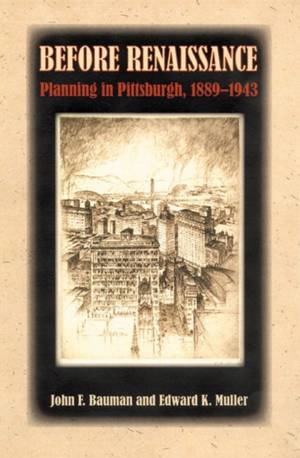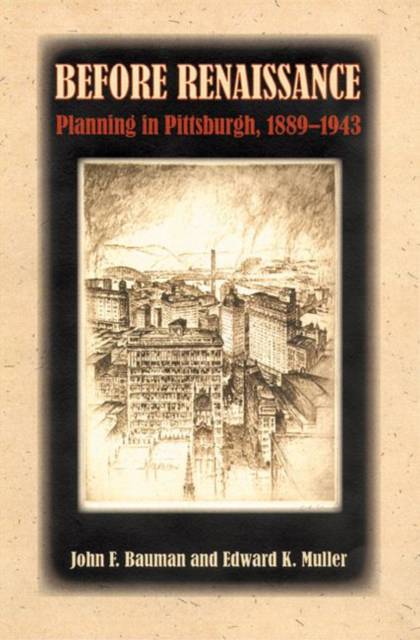
- Afhalen na 1 uur in een winkel met voorraad
- Gratis thuislevering in België vanaf € 30
- Ruim aanbod met 7 miljoen producten
- Afhalen na 1 uur in een winkel met voorraad
- Gratis thuislevering in België vanaf € 30
- Ruim aanbod met 7 miljoen producten
Zoeken
€ 91,95
+ 183 punten
Omschrijving
Before Renaissance examines a half-century epoch during which planners, public officials, and civic leaders engaged in a dialogue about the meaning of planning and its application for improving life in Pittsburgh.
Planning emerged from the concerns of progressive reformers and businessmen over the social and physical problems of the city. In the Steel City enlightened planners such as Frederick Law Olmsted, Jr., and Frederick Bigger pioneered the practical approach to reordering the chaotic urban-industrial landscape. In the face of obstacles that included the embedded tradition of privatism, rugged topography, inherited built environment, and chronic political fragmentation, they established a tradition of modern planning in Pittsburgh.
Over the years a m+lange of other distinguished local and national figures joined in the planning dialogue, among them the park founder Edward Bigelow, political bosses Christopher Magee and William Flinn, mayors George Guthrie and William Magee, industrialists Andrew Carnegie and Howard Heinz, financier Richard King Mellon, and planning luminaries Charles Mulford Robinson, Frederick Law Olmsted Jr., Harland Bartholomew, Robert Moses, and Pittsburgh's Frederick Bigger. The famed alliance of Richard King Mellon and Mayor David Lawrence, which heralded the Renaissance, owed a great debt to Pittsburgh's prior planning experience.
John Bauman and Edward Muller recount the city's long tradition of public/private partnerships as an important factor in the pursuit of orderly and stable urban growth. Before Renaissance provides insights into the major themes, benchmarks, successes, and limitations that marked the formative days of urban planning. It defines Pittsburgh's key role in the vanguard of the national movement and reveals the individuals and processes that impacted the physical shape and form of a city for generations to come.
Planning emerged from the concerns of progressive reformers and businessmen over the social and physical problems of the city. In the Steel City enlightened planners such as Frederick Law Olmsted, Jr., and Frederick Bigger pioneered the practical approach to reordering the chaotic urban-industrial landscape. In the face of obstacles that included the embedded tradition of privatism, rugged topography, inherited built environment, and chronic political fragmentation, they established a tradition of modern planning in Pittsburgh.
Over the years a m+lange of other distinguished local and national figures joined in the planning dialogue, among them the park founder Edward Bigelow, political bosses Christopher Magee and William Flinn, mayors George Guthrie and William Magee, industrialists Andrew Carnegie and Howard Heinz, financier Richard King Mellon, and planning luminaries Charles Mulford Robinson, Frederick Law Olmsted Jr., Harland Bartholomew, Robert Moses, and Pittsburgh's Frederick Bigger. The famed alliance of Richard King Mellon and Mayor David Lawrence, which heralded the Renaissance, owed a great debt to Pittsburgh's prior planning experience.
John Bauman and Edward Muller recount the city's long tradition of public/private partnerships as an important factor in the pursuit of orderly and stable urban growth. Before Renaissance provides insights into the major themes, benchmarks, successes, and limitations that marked the formative days of urban planning. It defines Pittsburgh's key role in the vanguard of the national movement and reveals the individuals and processes that impacted the physical shape and form of a city for generations to come.
Specificaties
Betrokkenen
- Auteur(s):
- Uitgeverij:
Inhoud
- Aantal bladzijden:
- 352
- Taal:
- Engels
- Reeks:
Eigenschappen
- Productcode (EAN):
- 9780822959304
- Verschijningsdatum:
- 15/10/2006
- Uitvoering:
- Paperback
- Formaat:
- Trade paperback (VS)
- Afmetingen:
- 153 mm x 239 mm
- Gewicht:
- 517 g

Alleen bij Standaard Boekhandel
+ 183 punten op je klantenkaart van Standaard Boekhandel
Beoordelingen
We publiceren alleen reviews die voldoen aan de voorwaarden voor reviews. Bekijk onze voorwaarden voor reviews.







